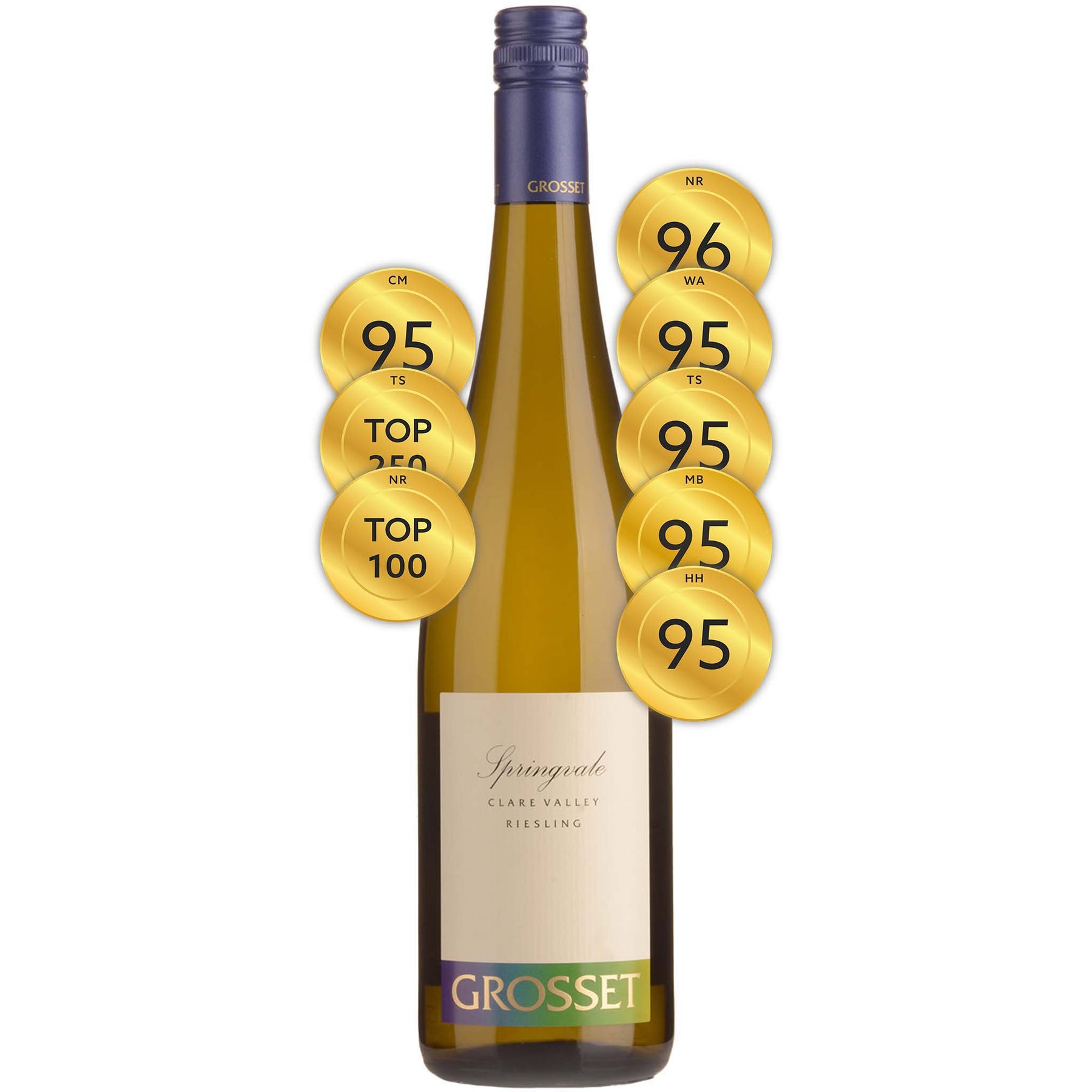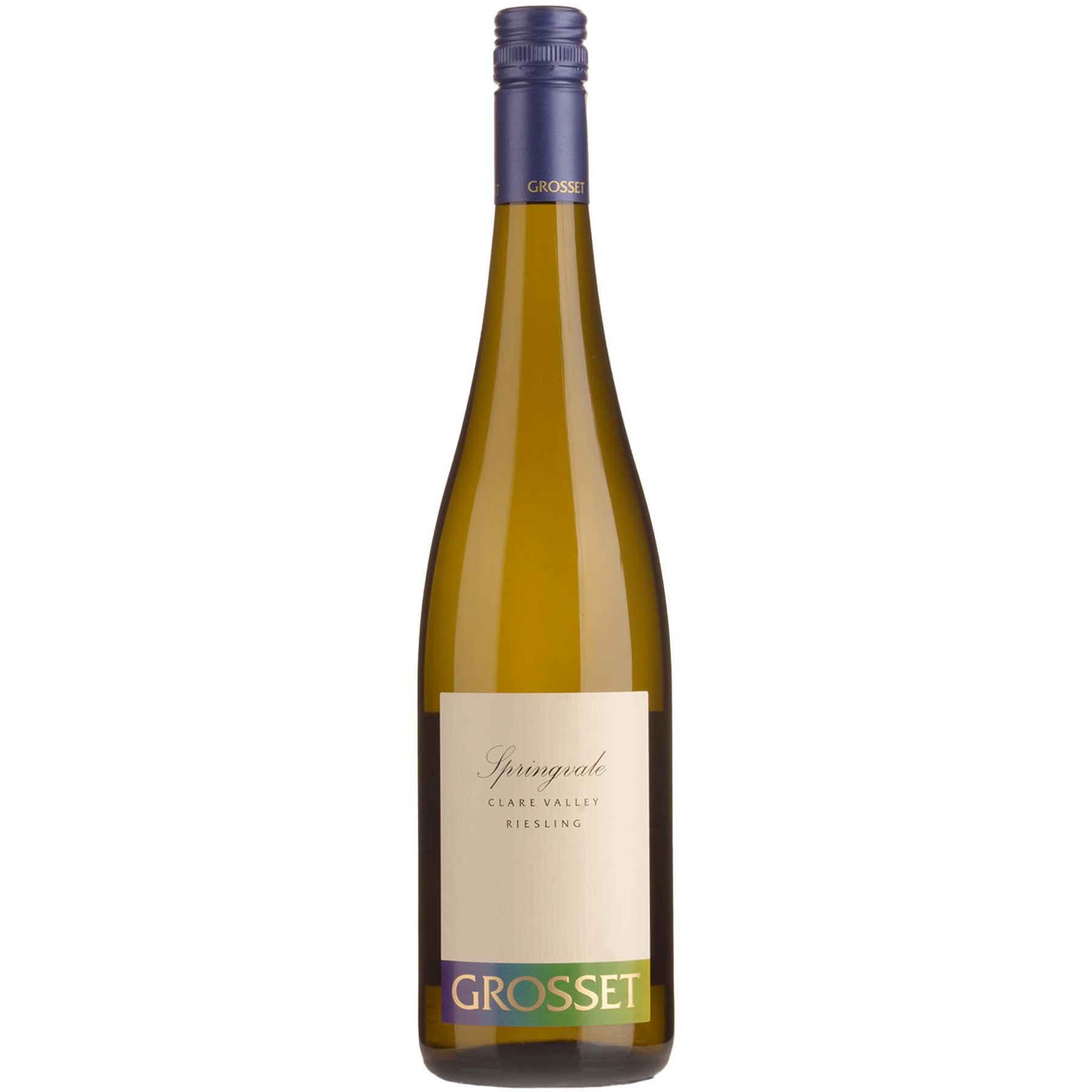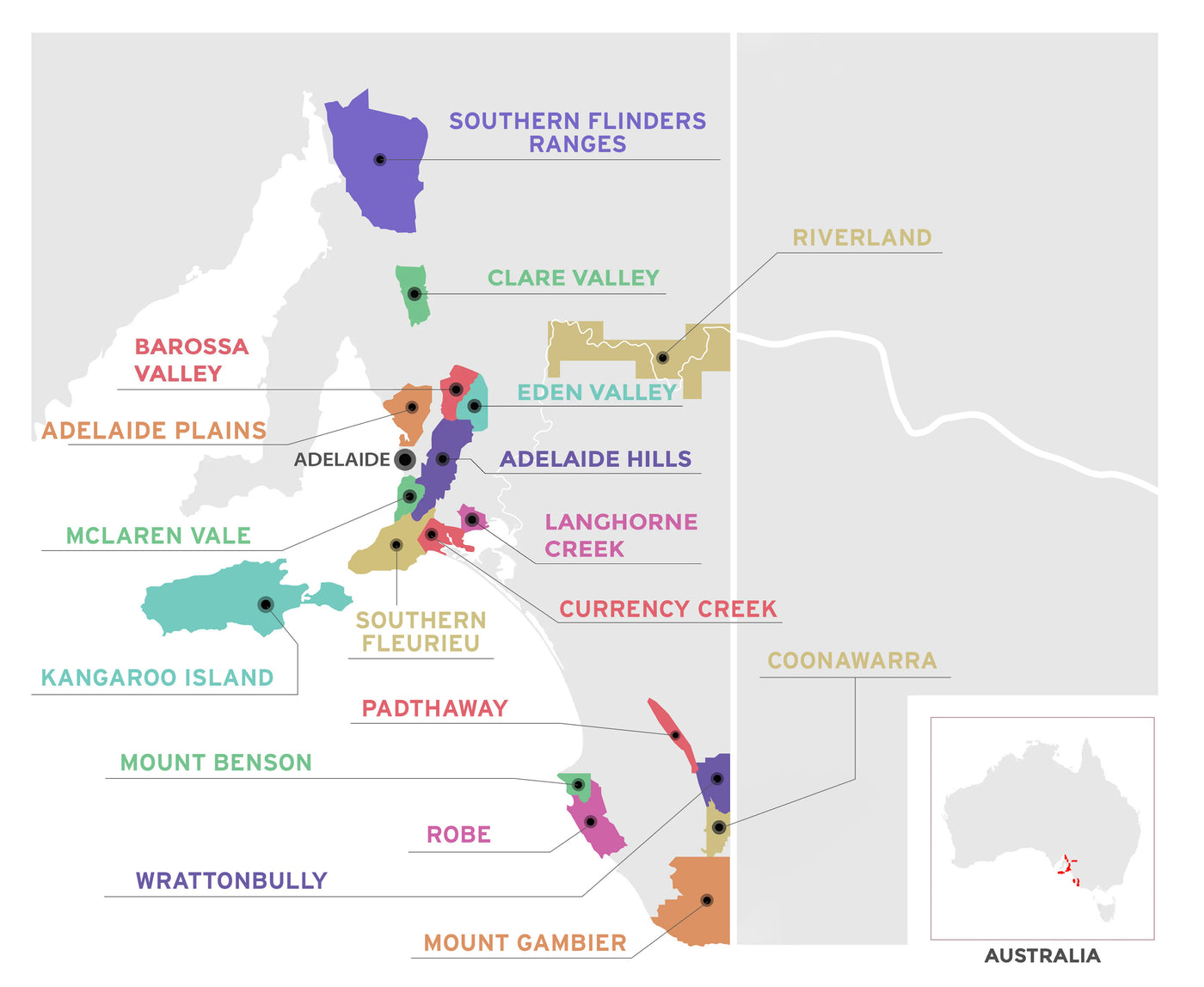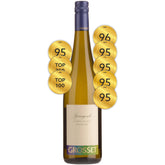

Grosset Springvale Watervale Riesling 2024
Style: White Wine
Variety: Riesling
Closure: Screwcap
Grosset Springvale Watervale Riesling 2024
Warehouse
34 Redland Drive
Vermont VIC 3133
Australia
Critic Score: 96
Alcohol: 12.5%
Size: 750 ml
Drink by: 2040
Nick Ryan Top 100 Wines of 2024
Tyson Stelzer Top 250 Australian Wines of 2024
Jeff Grosset proclaims 2024 as the most pristine fruit he has seen since he first planted in the Clare Valley in the early 1980s.
"Time will most certainly reveal this to be one of the greatest in Grosset’s 44 vintage history." Tyson Stelzer
The Grosset Springvale Riesling may sit somewhat in the shadow of its Polish Hill sibling but it is in its own right one of the benchmark rieslings of the Clare Valley. It is renowned for its aromatic complexity, pure fruit flavours and mouth-watering slatey acidity. The wine is fresh and mineral, typified by lemon curd, lime and chamomile aromas and generous flavours. A classic acid cut runs through the core, providing superb line and mineral length. The first vintage of the Grosset Springvale Riesling was produced in 1981.
"Jeffrey Grosset’s Clare Valley rieslings are a must-buy every year, but in a year like 2024 they become a 'sell a kidney to buy more' proposition. His magisterial Polish Hill wine will be a long-lived classic, but right now this utterly beguiling offering from his Watervale vineyard, strewn with citrus blossom, lifted by lemongrass and electrified with thrilling acidity, is undeniable." Nick Ryan
"The aromatics are quintessential Clare riesling – intense and pure lemon lime, with depth on the mid-palate: mouth-puckering, fine, and lingering on a long, sumptuous finish. Thanks to a cool season, biodynamic farming and the unique site of red loam-over-limestone (and slate), the typical generosity expressed by this wine is enhanced by fresh, powerful varietal characteristics. Produced from riesling grown biodynamically at the Grosset Springvale Vineyard." Grosset
Expert reviews
"Jeffrey Grosset’s Clare Valley rieslings are a must-buy every year, but in a year like 2024 they become a 'sell a kidney to buy more' proposition. His magisterial Polish Hill wine will be a long-lived classic, but right now this utterly beguiling offering from his Watervale vineyard, strewn with citrus blossom, lifted by lemongrass and electrified with thrilling acidity, is undeniable." Nick Ryan, The Weekend Australian - 96 points and Top 100 Wines of 2024
"Polish Hill has this covered but this is still a fabulous Springvale Riesling. It’s an interesting wine, driven by lemon and lime as you would expect but with anise, marshmallow and pretty floral characters floating about. The anise is almost into red licorice territory, which seems bizarre in a riesling, but it’s definitely there, like a lurker to the forum of citrus and tonic water. Grosset has been a star producer for all the time I’ve been in wine but right now its wines are as good or better than they’ve ever been. I’m opting for a score of 95 but I could easily go 96. Drink: 2024-2038." Campbell Mattinson, The Wine Front - 95 points
"The 2024 Springvale Riesling is lemony and tight in the mouth with layers of pith and pepper, citrus and grass. The phenolics are chalky and quite firm, and this stretches out the flavor over the finish. A superb wine, this is austere in its way but excellent nonetheless. It will take some time to open out; the fleshy fruit is there, but it's folded away for now. 12.5% alcohol, sealed under screw cap. Drink: 2024 - 2044." Erin Larkin, Wine Advocate - 95 points
"An attractive and approachable, understated expression emerges from this '24 release of Springvale. Lemon-lime, some orange peel, faint minty notes, green apple juice, with some lemon verbena and tutti-frutti floral notes expressed through scents and flavours alike. Texture is somewhat waxy, the finish cool and firm, bright and zesty. Very enjoyable right now, a little lighter on in character, with lots of pleasing, cool and bright charisma. Drink 2024-2035." Mike Bennie, Halliday Wine Companion - 95 points
"Spicy, yeasty, grapefruit-pith, fresh and reserved aromas, bright and nascent, the palate soft and grapy, rounded and easygoing but somewhat short on drive. This is a baby and will be so much more interesting in a year or two, minimum. Plenty of potential. Drink: 2025 to 2036." Huon Hooke, The Real Review - 95 points
"The aromatics of this vintage are so lifted you can smell them before you even lift the glass! This pristine, cool season has energised the full suite of granny smith apple, lemon and lime blossom and fruit, set to a them of impressive concentration that lingers on a cool finish of icy acidity and grand endurance. One of the greats. Drink 2024 – 2039." Tyson Stelzer - 95 points and Top 250 Australian Wines of 2024
Awards
Nick Ryan Top 100 Wines of 2024
Tyson Stelzer Top 250 Australian Wines of 2024
Springvale vineyard
The Grosset Springvale Vineyard is a six‑hectare, organically certified vineyard situated off Springvale Road in the Clare Valley. It is a hilltop site at one of Watervale's highest elevations (460 metres above sea level), with high exposure to sunlight. The vineyard is part of a much larger property at Watervale, however, the balance of the property is being progressively returned to native vegetation as greater species diversity facilitates natural pest and disease management.
The vineyard is relatively close-planted at 2,500 vines per hectare and produces an average of just two-and-a-half bottles of wine per vine. The vineyard comprises three clones of Riesling, Clone GM110 (tight bunches, floral, Germanic and spiced), Clone 156 (rare clone from Jesuit inspiration, loose bunch, mellow, spiced, limes, steely) and Clone GM198 (most commonly used in Australia; spiced, luscious, generous). The sturdy and resilient vines produce compact yellow-green bunches of moderate sized berries.
The Springvale Vineyard is a unique viticultural site due to its geology, relative isolation and high altitude. The thin topsoils are red loams interspersed with shale over limestone and, atypical for this sub-region, the vines are deeply rooted into slate bedrock. This formation dates back many hundred million years. There is a north-south fault line on the eastern border that limits the vineyard's expansion.
The cool-fermented Grosset Springvale Riesling is renowned for its aromatic complexity, pure fruit flavours and mouth-watering slatey acidity. The wine is fresh and mineral, typified by lemon curd, lime and chamomile aromas and generous flavours. A classic acid cut runs through the core, providing superb line and mineral length.

The four Grosset estate-owned vineyards
About Jeffrey Grosset

"Jeffrey Grosset wears the unchallenged mantle of Australia's foremost riesling maker. Grosset's pre-eminence is recognised both domestically and internationally." James Halliday
Grosset was 15 when his father, an electrician, came home with a bottle of wine and shared it with the family. It was riesling and Jeffrey was gobsmacked. So began the Grosset story. The following year Jeffrey enrolled at Roseworthy Agricultural College, completing an Agriculture degree in 1973 and an Oenology degree in 1975. At the age of 21 Jeffrey started work at Seppelt Great Western, before heading to a German winery with a 1000-tonne crush as assistant winemaker, only to find the chosen French winemaker had changed his mind, leaving Grosset in charge. He subsequently returned to Australia and worked at Lindeman's Karadoc winery with its 30,000-tonne crush. But ultimately he wanted to start his own label.
In 1981 Jeffrey purchased an old milk depot in the historic township of Auburn 1981 and established Grosset Wines. He produced four wines that vintage under his own label, 800 dozen bottles in total. Now, 42 years later, Grosset is regarded as arguably the best maker of riesling in Australia and produces nine wines and 11,000 bottles per vintage.
Grosset is not shy about challenging tradition and questioning accepted practices. In the late 1980s, he was the leader of a successful movement to only allow the use of the word Riesling on Australian wines that were made specifically from the Riesling grape. Until that point, a significant number of Australian wines with Riesling on their label were made from other grape varieties.
Grosset was also the driving force behind a decision in 2000 by Clare Valley Riesling producers to switch to screwcap closures for their wines and to encourage Australian and New Zealand winemakers to do the same, and for the public, retailers and media to embrace the change. He continues to privately fund research into the subject.
Next, he established the Grosset Gaia Fund, donating to charities supporting youth, the arts and the environment. Recently he has led the way for Australian winemakers to use blockchain technology for verification of product provenance, authenticity and seal integrity.
Jeffrey Grosset has received a great deal of local and international recognition for his winemaking. In 1998, he was the first recipient of "Australian Winemaker of the Year" from Gourmet Traveller Wine magazine and was named the "International Riesling Winemaker of the Year" at the Riesling Summit in Hamburg, Germany. He was nominated in 2005 as one of the world's "50 Most Influential Winemakers" by Wine & Spirits and in 2006, named as one of the "Top 10 White Winemakers" in the world by Decanter magazine.
Grosset's philosophy has remained steadfast over the years, the emphasis is on purity of fruit. The estate vineyards, which are ACO certified organic, are hand-tended and each bunch of grapes is harvested at optimum ripeness. The winemaking process is gentle and uncomplicated. With dedication, discipline and the application of knowledge garnered through decades of experience, the result is the finest expression of variety and place.

South Australia
South Australian is responsible for more than half the production of all Australian wine. It is home to more than 900 wineries across 18 wine regions. The regions are Adelaide Hills, Adelaide Plains, Barossa Valley, Clare Valley, Coonawarra, Currency Creek, Eden Valley, Kangaroo Island, Langhorne Creek, McLaren Vale, Mount Benson, Mount Gambier, Padthaway, Riverland, Robe, Southern Fleurieu, Southern Flinders Ranges and Wrattonbully.
Many of the well-known names in the South Australian wine industry established their first vineyards in the late 1830s and early 1840s. The first vines in McLaren Vale were planted at Reynella in 1839 and Penfold's established Magill Estate on the outskirts of Adelaide in 1844.
South Australia has a vast diversity in geography and climate which allows the State to be able to produce a range of grape varieties - from cool climate Riesling in the Clare and Eden Vallies to the big, full bodied Shiraz wines of the Barossa Valley and McLaren Vale. Two of Australia's best-known wines, Penfolds Grange and Henschke Hill of Grace, are produced here. There is much to discover in South Australia for the wine lover.


